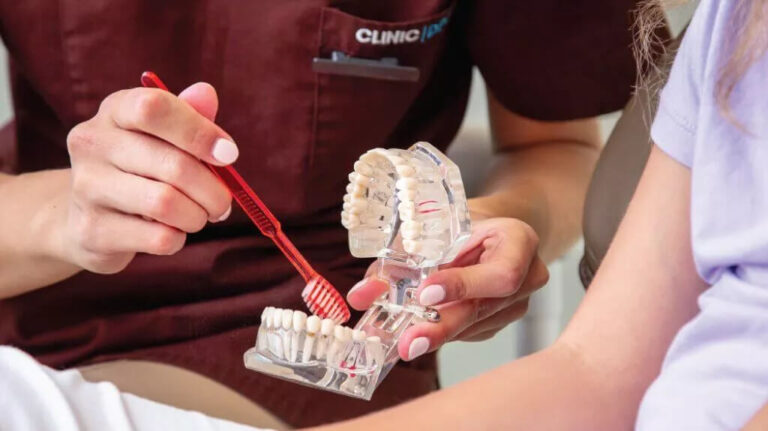Dentophobia, or fear of dentists, is incredibly common. According to surveys, between 13% and 24% of people worldwide suffer from it. Dentophobia can arise for a variety of reasons, such as previous negative experiences or anxiety that treatment will cause pain. Dentist Karina Ratkevič and psychologist Karolina Gurskienė, both of the CLINIC | DPC clinic network, share the same opinion – this fear can definitely be overcome with the joint efforts of the doctor and patient.
The origins of fear in childhood
Many readers, especially older ones, probably remember a time when a visit to the dentist was a nightmare: no painkillers, fear-inducing devices and often rude behavior. Stricter treatment methods and little attention to emotions have left their mark on many. The patient is left with his or her own thoughts and interpretations, which are not necessarily correct, after a painful procedure.
“Strong negative experiences are etched into our psyche. Later, as soon as the brain recognizes the same images, it seems to take us back to the strongest situation related to the stimulus. If as a child you were held down in a chair to keep you still, if you were in a lot of pain and then were scolded by an angry nurse, even thirty years later, when you go to the clinic, you will relive the unpleasant memories,” explains K. Gurskienė.
She advises you to try to understand your fear, recognize the cause and realize that it is in the past. Modern dentistry has advanced greatly, both in terms of treatment methods and the culture of communication with patients. Therefore, a situation like in childhood will certainly not happen again. When you arrive at a new clinic, prepare a clean place for new memories. You can allow yourself to experience new emotions. And so you will replace an unpleasant experience with a pleasant one.
The price of fear – decayed teeth
Fear has led people to avoid preventive dental care to this day. To keep your teeth healthy, regular visits to the dentist’s office are essential for dental check-ups, repairing decayed teeth and professional oral hygiene at least once every six months to prevent tooth and gum disease. However, patients are often fearful and only decide to visit the dentist when they are experiencing symptoms or severe pain.
According to dentist Karina Ratkevič, a dentist at CLINIC | DPC, improper dental hygiene leads to the formation of bacterial plaque, which can lead to chronic inflammation of the teeth, such as gingivitis and periodontitis, as well as to the spread of tooth decay and the development of acute ulcers. This puts the person in pain and with a fear of dentists in a vicious circle: the stronger the complaints and the psychological tension, the greater the fear of the inevitable visit to the dentist.
However, it is important to know that the worst thing you can do is to refuse to visit the dentist’s office. Prevention is an essential part of a dentist’s work and can help you avoid more difficult, longer and more fearful treatment. Sometimes, by identifying and correcting poor oral care habits, dental disease can be avoided altogether.
Speak up about your fears
Like any other fear, fear of dentists can take time to overcome. “In our experience, patients are usually not afraid of a specific treatment, but of the uncertainty that there might be more unresolved dental problems that need to be treated. The best solution to this problem is to have a frank discussion with your dentist and dental hygienist,” says K. Ratkevič.
During your visit, the specialists will do everything they can to make you feel comfortable and maybe even tell you stories to help you calm down. During the visit, try to divert your thoughts and think about positive things – perhaps you are planning a holiday or have a birthday coming up – positive thoughts will help you to take your mind off the treatment process. If you are very anxious, choose an earlier appointment time so that you don’t have to worry all day about your upcoming visit. Try to understand why you are going to the dentist and take an interest in the procedures that will be carried out during your upcoming visit. Most of the time, it is the unknown that causes most of the fear, and once you have got rid of it, your anxiety is reduced. If the situation is particularly difficult, a psychotherapist can help you overcome your fear of dental work and pain. Sometimes the specialist will provide a course of psychotherapy, and sometimes he or she will simply prescribe a sedative.
However, the most important thing is to find out what is causing the anxiety and fear, and not to keep them to yourself. One of the best ways to manage fear is to express your anxiety to the dentist: we are here to make the client feel comfortable in the dentist’s chair. Regular visits to the dentist can help you keep your teeth in better condition, avoid complicated procedures and you will feel more at ease with each visit. “It’s important that you feel confident in your dentist. Only an understanding dentist who respects the patient’s senses can reduce the feeling of fear,” concludes the dentist.





